Cassava Starch Bioplastic FAQs
You may have already browsed through our range of compostable plastic carrier bags or maybe you’ve seen cassava bags in the media. Here we will explain what this material is all about.
The material used in our cassava starch bags is called Enviplast. It ‘s a bioplastic material consisting of cassava root (a natural organic starch) as well as vegetable oils and vegetable based polymers. This material is not petroleum-based like the normal plastic bags that have been polluting the world for decades.
Instead, it is compostable in aerobic composting conditions and won’t leave behind any chemical trace elements. In other words, they don’t produce microplastics particles.
Bags made from this cassava starch material are an environmentally-friendly solution to the world’s critical problem with petroleum-based bags.
FAQ’s
Products made from Cassava Starch
-
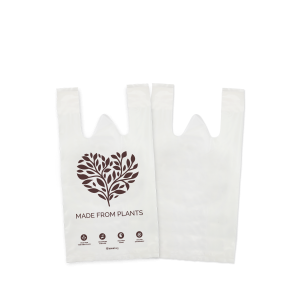 Small T-Shirt Cassava Bag – White
Small T-Shirt Cassava Bag – White -
 Large T-Shirt Cassava Bag – Blue
Large T-Shirt Cassava Bag – Blue -
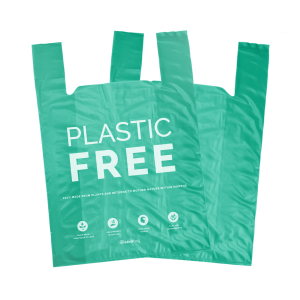 Medium T-Shirt Cassava Bag – Green
Medium T-Shirt Cassava Bag – Green -
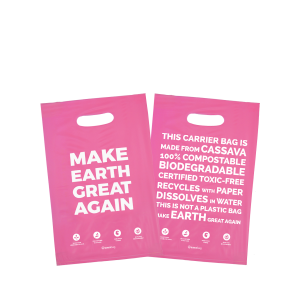 Small Griphole Cassava Bag – Pink
Small Griphole Cassava Bag – Pink -
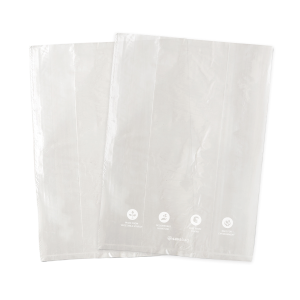 Large Polybag Cassava Bag – Clear
Large Polybag Cassava Bag – Clear -
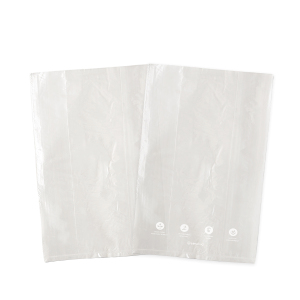 Medium Polybag Cassava Bag – Clear
Medium Polybag Cassava Bag – Clear -
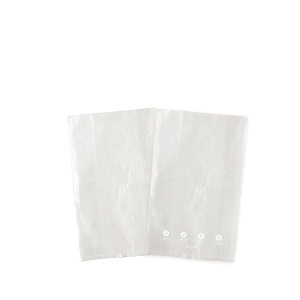 Small Polybag Cassava Bag – Clear
Small Polybag Cassava Bag – Clear -
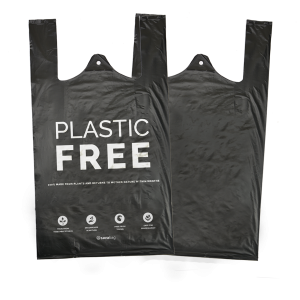 Large T-Shirt Cassava Bag – Black
Large T-Shirt Cassava Bag – Black -
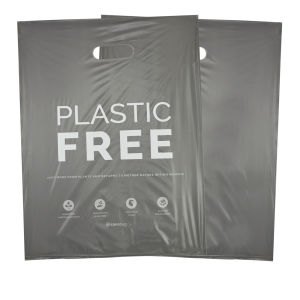 Large Griphole Cassava Bag – Grey
Large Griphole Cassava Bag – Grey -
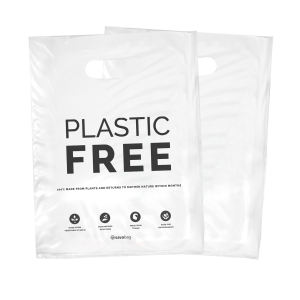 Medium Griphole Cassava Bag – White
Medium Griphole Cassava Bag – White
Certifications
Enviplast holds various test reports, certifications and accreditations to confirm it’s safety and sustainability.
- Controlled composting; decomposes with biodegradation at a rate of 100% in 180 days, and 84% in 84 days.
- Dissolves in the sea and rivers; tested at a rate of 81% in 133 days in sea water, and 90% in 141 days in river water.
- Non-toxic; passed all plant ecotoxicity tests including EN13432 and OECD 423.
- For aerobic biodegradation under controlled composting (58˚C), the ISO 14855 standard requires > 90% biodegradation within 180 days. This material will biodegrade 100% in this time.
- For disintegration under controlled composting (58˚C), the ISO 16929 standard requires > 90% disintegration into pieces smaller than 2mm within 12 weeks. This material will disintegrate 85% in this time.
- For disintegration at under 30°C, the ISO 20200 standard requires > 90% disintegration into pieces smaller than 2mm within 26 weeks. This material will disintegrate 84%.
- For characteristics, the general standard is to be > 50% organic. This material has been tested to show that it contains 99.5% organic material.
- For compost quality, the test reported no negative effect as per AS 4454 standard.
- For Ecotoxicity, the EN 13432 (Appendix E) standard requires germination rates and plant biomass to be impacted no more than 10%. This material reported 2% Cress, 3% Barley.
- For standard soil biodegradation, ISO 17556 requires 60% biodegradation. This material tested at 59.4%.
- For marine aerobic biodegradation, ASTM D6691 requires > 90% in 133 days. This material tested at 85.3% ± 9.1%.
- For aqueous aerobic biodegradation, ISO 14851 requires > 90% in 141 days. This material tested at 90%.
Please note that while this material currently misses out on the EN13432 and AS4736 certification standards by a whisker, there are many plastic bags on the market that have 50% plant-based material and a range of mineral and chemical accelerants added at the manufacturing stage in order to qualify as compostable.
Enviplast cassava starch material is 99.5% organic material and while it may take longer to decompose, it will decompose 100% and return to a natural state (unlike any bags containing petroleum chemicals).